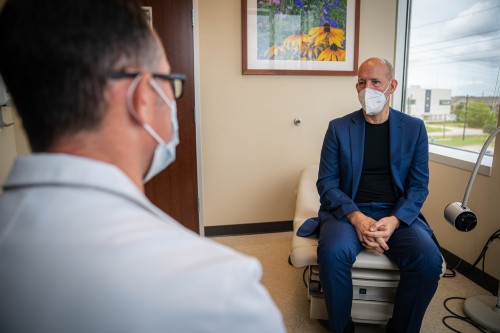
The MRI revealed a very suspicious lesion, a mass replacing almost the entire prostate, extending to the bladder wall. This, coupled with his elevated PSA, was highly concerning.
In early January 2021, Griffin underwent a prostate fusion biopsy using specialized equipment that allows the physician to perform a transrectal ultrasound of the prostate and to “fuse” the ultrasound images, in real time, with the prior MRI images. Memorial Hermann Sugar Land Hospital was the first hospital in Fort Bend County to utilize this approach.
This technology allows for more accuracy in targeting specific areas of the prostate to biopsy. In Griffin’s case, all 14 biopsies revealed cancer. Prostate cancer is graded from 1 to 5, with 5 being the most aggressive. The majority of Griffin’s biopsies were grade 3, with some being grade 4.
A major concern was whether Griffin’s cancer had metastasized, or spread to other parts of his body. Prostate cancer can spread to regional lymph nodes and beyond to the bones. Luckily, Griffin’s head-to-toe bone study and CT scan showed that his cancer had not metastasized to his bones.
His physician discussed all of the results with him. “My physician was positive from day one, but he never sugarcoated anything,” says Griffin. He informed me that I had all of the indicators of high risk and that we needed to make a plan and take action.”
The recommended plan included surgical removal of Griffin’s prostate, potentially followed by radiation and hormone therapy. In early February 2021, Griffin underwent a robotic-assisted laparoscopic radical prostatectomy (RALP), a minimally invasive procedure to remove his prostate, and a bilateral pelvic lymph node dissection, removal of a chain of lymph nodes on both sides of the pelvis. Griffin spent one night in the hospital and was home the next day.
Typically, patients’ PSA levels are checked three months after surgery, but in Griffin’s case, his levels were checked about six weeks afterward. Griffin’s PSA had decreased to 5 (from a high of about 117 before surgery), with the goal of being less than 0.1. A month later, his PSA was 5.3, indicating the presence of some residual cancer.
A PET scan, used to detect the metabolic activity of cancer, showed evidence of cancer where the prostate had been, adjacent to the bladder. Griffin was referred to radiation oncologist Shariq Khwaja, MD, clinical assistant professor in the Vivian L. Smith Department of Neurosurgery at McGovern Medical School at UTHealth Houston and medical director of radiation oncology at Memorial Hermann Memorial City Medical Center.
Dr. Khwaja prescribed a series of 39 radiation treatments, which began in July 2021. According to Khwaja, younger patients with aggressive prostate cancer are recommended to consult with both radiation oncologists and urologists because they have a higher likelihood of needing either adjuvant or early salvage radiation therapy.
“Despite Mr. Griffin having numerous high-risk features that required radiation therapy, his surgery was successful,” Khwaja says. “He is doing excellent, and we will continue to monitor him with surveillance PSAs to ensure that he continues to respond well to treatment.”
The goal of multimodal treatment is to remove as much of the cancer with surgery and then let radiation do the rest.
Griffin’s physicians are optimistic about his outcome and hope the multimodal treatment will render the cancer undetectable, now and in the future. Griffin is also upbeat. “My philosophy is that it could always be worse,” he says. “And my approach is to take life as it comes.”
Griffin certainly lives by his own advice. He has been traveling around the world with his wife to celebrate positive milestones related to his cancer treatment. In June 2021, he went to South Africa and Zimbabwe for a photo safari just before his 39 treatments began. He then traveled to Greece to celebrate the end of his treatments. In February 2022, he visited Antarctica, and in June he went to Italy. All of these trips marked a reason to celebrate—the most recent one being a completely undetectable PSA.
Contact Us
For more information about Memorial Hermann Cancer Centers, including how to get connected to our support services or an affiliated provider, please call (833) 770-7771 or fill out the form below to be connected to one of our Oncology Nurse Navigators.